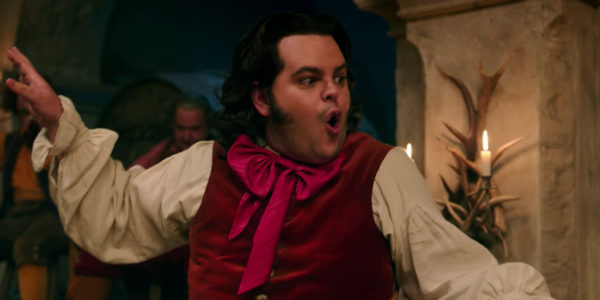Movies are not only meant to inspire and make people feel something by the time the credits roll, but they are also meant to reflect the various demographics that pay to see them to capture that feeling of art connecting audiences. But unfortunately, Hollywood hasn’t made much progress in representing every demographic. In fact, they have done a piss-poor job at reflecting the LGBTQ community.
All The Noise, Noise, Noise
When I saw the 2017 live action adaptation of Beauty And The Beast, I left the theater with a massive ache in my gut. Mainly because leading up to the film’s release, there was a lot of publicity over Beauty And The Beast apparently introducing its first ever openly gay character with LeFou, the bumbling sidekick of the film’s villain Gaston.
Before I saw the film, I was cautiously optimistic but I went ahead and saw what the noise was about anyhow. But as it turns out, all that noise over LeFou being gay and having a supposed “gay moment” at the end which was a “blink and you’ll miss it” moment of LeFou waltzing with another man as all the characters were switching up dance partners all turned out to be just noise and I was furious.

As both a film lover and as a homosexual, I have grown tired of coding where a particular character’s sexuality is not only speculated but to the point where it is unclear whether they are gay at all. A similar situation happened with the film adaptation of Power Rangers. During a scene where the Rangers become confessional, Trini played by Becky G, is asked if she had any boyfriend problems and she remains silent.
But when she is asked if she was having girlfriend problems, she remains silent again, making her sexuality unclear. Yet Lionsgate, the studio behind Power Rangers, decided to drum up some noise about it anyhow, calling the film the first with an openly gay superhero. But when watching that scene, it is hard to tell because of how unresponsive Trini is.
I wanted to believe that Trini’s subtle response was a tiny step forward. But that’s only because I am aching to see some form of progress when it comes to positive depictions of LGBTQ people in mainstream Hollywood. What frustrates me that after all the makers behind Beauty And The Beast and Power Rangers have patted themselves on the back over fake PR noise, they’ll go back to making more stories about heterosexual people while homosexuals will continue to remain invisible.
Lighten Up On The Jokes
Not only that but Hollywood has had a tendency to use us as a punchline as well. Recently, I suffered through the film adaptation of Baywatch which reinforced the tired Hollywood cliche known as the “gay panic joke” because it had a scene of The Rock kissing an unconscious Zac Efron and a scene of Zac Efron dressing in drag just for laughs.
Last year, I suffered through an anger inducing double whammy. The first offender is Dirty Grandpa which featured an African-American side character named Bradley that only exists as both a comedic punchline and a flamboyant stereotype with no part in the main storyline. The second is Mike And Dave Need Wedding Dates which features a bisexual character named Terry who has no integral part in the storyline but exists as a token gay character that is stereotypically butch and craves for sex.
It is possible for Hollywood to allow gay people to live openly and without being reduced to any tokenistic tendencies? In fact, they have done it before. Just last year, in Neighbors 2: Sorority Rising, they had the character of Pete played by Dave Franco come out as gay and they even had a kiss scene between Pete and his partner. Even if they played a small part and didn’t have much to do, it was refreshing to see a gay couple reflected positively and in a less stereotypical manner in a mainstream film such as that one.
Is Hollywood Homophobic?
Hollywood being so keen on queer-coding likely begs this question:
“Is Hollywood homophobic?”
Well, I don’t think Hollywood is “conversion therapy” or “hate crime” homophobic. But I do think their unwillingness to greenlight stories centering around gay people stems from a lack of interest in telling our stories and/or a fear that movies about gay people won’t play well overseas. Especially considering that there are plenty of countries that have strict anti-gay laws like Russia and China.
But in spite of that likely fear, I say Hollywood should take a risk anyhow. I mean, if Hollywood is willing to take a chance on a $175 million King Arthur adaptation with a lack of star power that nobody asked for, why can’t they take a chance on something like a gay romantic comedy? Even if it isn’t profitable overseas, it could at least be profitable in the States. The Best Picture winning Moonlight was made for around $1 million and grossed about $27m stateside. So there is an audience for gay-themed films.
Conclusion
So in closing, I want to say that there are people in this world who are unsure of their sexuality. I was one of those people growing up. But not every person that is gay, lesbian, bi, or trans is struggling to come to terms with who they are and Hollywood has a responsibility to reflect that.
For those of you in the LGBTQ community and to those of you who aren’t, are you as flustered with queer coding as I am?
Does content like this matter to you?
Become a Member and support film journalism. Unlock access to all of Film Inquiry`s great articles. Join a community of like-minded readers who are passionate about cinema - get access to our private members Network, give back to independent filmmakers, and more.